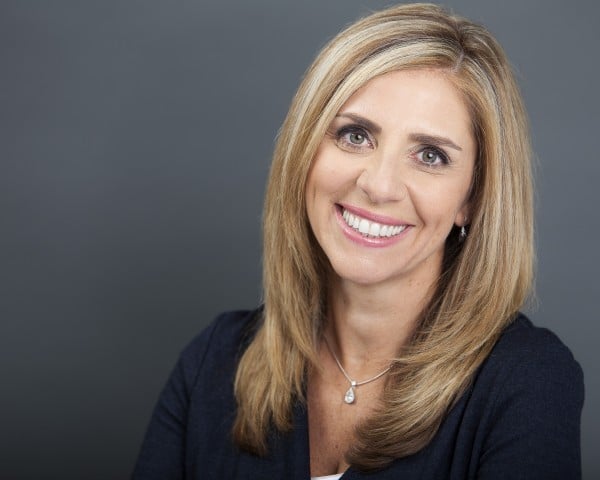Senior Facebook executives must be feeling pretty smug this month. Colonial gaffes aside, much of Google News has been populated by the social network’s skyrocketing user figures and how it’s keeping shareholders happy. Meanwhile, arch-nemesis Twitter appears to be digging its own grave with its latest format change as users (ironically) tweet #RIPTwitter.
In such circumstances, Nicola Mendelsohn, Facebook’s vice president for Europe, the Middle East and Africa, would be forgiven for being as bouncy as Mark Zuckerberg’s baby daughter.
When we meet, she is sitting alongside regional managing director Jonathan Labin at the One&Only Royal Mirage in Dubai. Top of their agenda is Facebook’s marketing plan for Ramadan and the network’s regional user numbers, which have reached 120 million. Of those, 110 million are on mobile, says Labin.
The numbers are impressive, although far more will be required if Zuckerberg’s proclamation that he intends Facebook to reach five billion users globally by 2030 is to be achieved. Particularly when more than a fifth of that number live in China, where Facebook is still very much banned.
Refusing to comment on China and fellow Facebook blacklister Iran, Mendelsohn says: “Mark Zuckerberg is a man with a very clear mission. From the day he created Facebook, he created it around the desire that the world should be open and connected so that people can share more. That’s the mission. So it is about making sure everyone on the planet has access to the internet and are all connected. I think the world will be better if we are. I believe him.”
Zuckerberg’s pet project of connecting the world by links and likes was set back earlier this month when his ‘Free Basics’ online access plan hit a couple of major snags in the form of India’s neutrality laws, a month after Egypt also inexplicably said no thanks to the prospect. Given that India has the world’s second largest population and Egypt has more than double those of Saudi Arabia and the United Arab Emirates combined, we are talking big numbers at stake. But Facebook will not be deterred from its mission, says Mendelsohn. “We are in 37 countries now and it is only one part of the Internet.org programme now, which is campaigning for the 60 per cent of the world’s population that aren’t connected to the internet to have the same experiences that you and I take for granted.” She adds: “We are absolutely committed to that, to Egypt and to India. [The Free Basics Plan is] something we are going to work through. We work very closely in the region with the operators so it’s a hope that through other ways people will continue to find access to the internet.”
And what about claims that Facebook has lost touch with its original audience – young people? With now parents, weird aunties and even pets being in possession of a Facebook account, the network’s next generation of users are seemingly veering towards more private forms of communication, including Snapchat and the Facebook-owned What’sApp, where they do not have to face any familial embarrassment. Mendelsohn, however, disagrees. “Young people do use Facebook and they use it a hell of a lot,” she says. “I am very lucky that I have four kids, three of them are teenagers, so I am able to see what my own children are doing and their own diet of social media and they are using multiple platforms as you would expect because they are experimenting with things and trying new things.
“What they tell us time and time again is that Facebook is the only place where you are your real identity and the only place where your friends are their real identity too. Do they use other platforms? Yes of course they do. But they always come back to Facebook. And we know that Instagram [also owned by Facebook] skews a younger audience because it’s a newer platform. But the exciting thing about Instagram is that it is growing quicker than Facebook did at its same age, just over five years old.”
Meanwhile, despite Facebook’s research on the Middle East – a 1,000-person survey conducted mostly in Saudi Arabia – claiming video will be users’ modus operandi this Ramadan, its recent ventures clearly show the demand for traditional news is far from dead. Facebook jumped on the newsstand bandwagon in November with its app Notify, attempting to succeed where Apple earlier failed (see opposite page). More worrying for news outlets however is the Instant Articles feature, which was described by David Carr of The New York Times as making media companies “serfs in a kingdom that Facebook owns”. Rather than directing users to a publisher’s site – thereby helping it generate much-needed revenue – the feature keeps the user firmly inside Facebook.
But the reality is, as Mendelsohn points out, instantly loading content is just what today’s mobile-first world demands. “People want to consume news on Facebook but when they click through, it’s one of the poorer experiences because it takes several seconds to download,” she explains. “In a world of mobile, we all get very frustrated with how long it takes. So creating Instant Articles is a way of publishers to make their content mobile first and to get their revenue sharing models in place as world.”
She adds: “News is often the number one thing when we do the yearly reviews. We have a lot of partnerships around the world with different news outlets, most in their early stages at the moment. And that is exciting.”











